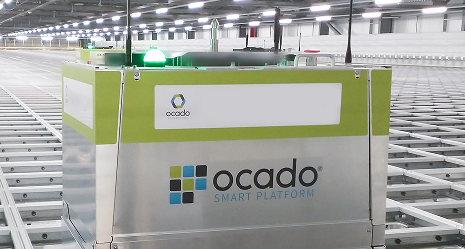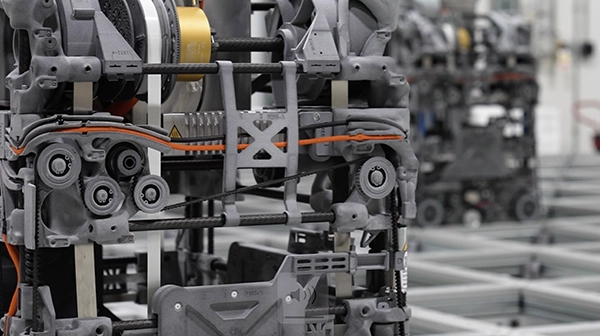- New curriculum, which includes coding lessons for primary children, introduced 1st September
- Children more clued up than parents, with 47% of 5-11 year-olds aware of the new curriculum
- Yet young people would still rather pursue a career in acting and football over computer programming
- To help counter this, Ocado Technology is launching Rapid Router, a free coding teaching resource designed to give every child in the country work-related coding skills
Two thirds (65%) of parents are unaware their primary school-aged children will learn to code at school from next week, according to new research from Ocado Technology, the division that powers Ocado.com, the online supermarket.
From the 1st September 2014, all primary and secondary school pupils in England will learn coding skills for the first time. This is part of the government's new Computing curriculum.
Thankfully, young people are more clued up than their parents. According to the poll of 1,000 5-11 year-olds, nearly half (47%) are fully aware of the new Computing curriculum and are excited about learning how to code. In fact, unbeknownst to their parents, more than a quarter (29%) of those surveyed said they already know some coding skills.
However, despite this enthusiasm, young people would still rather pursue a career in acting and football over computer programming. Six in ten (58%) girls would prefer to become actresses, compared to 20% who would rather be computer programmers. Likewise, nearly half (47%) of boys said they would rather pursue professional footballing careers, versus 34% who would prefer to be computer programmers.
To help counter this, Ocado Technology has teamed up with 14-year-old Amy Mather, European Digital Girl of the Year, and specialist primary computing teachers, to launch Rapid Router, a free coding teaching resource. Designed to help 200,000 primary teachers give every child in the country work-related coding skills, the engaging Key Stage 1 and lower Key Stage 2 resource includes a fun coding game with a "create" mode for pupils to build their own challenges. Tested on over 150 primary pupils, it features more than 50 levels that help teach children the basic principles of programming. It also includes a series of videos where different types of computer programmers explain how they use coding in their careers.
14-year-old Amy Mather, who designs games and writes her own software, said: You don't have to be a doctor, scientist or politician to help change the world; you can do it with code. That's why the new Computing curriculum and initiatives like Rapid Router are so important."
We can't progress unless we teach the next generation how to create, instead of consume, technology, which is why I think children should be taught computer programming as soon as they are able to read and type. By giving primary school pupils the skills and opportunities they need to write their own computer programs, they will not only have a lot of fun, but they'll be able to code a better future."
Parents are keen to learn coding skills too
It's not just primary school pupils who are keen to learn how to program computers. According to a survey of more than 300 parents of primary school-aged children, three quarters (75%) said they would like to learn to code so they can help with their children's computer science homework. The same amount said they wish they had the chance to learn coding at school as it would have given them better career prospects.
Paul Clarke, Director of Technology at Ocado, said: As a technology business, we at Ocado feel passionately that we have a responsibility to help inspire and educate the next generation of computer scientists, some of whom will come and work for us.
However teaching children to program is not just about nurturing the next generation of software engineers; being able to write code is a transformative and disruptive meta-skill that needs to be seen as being of huge potential value whatever your future holds."
The new Computing curriculum will help equip these children with the skills they need to realise their ambitions and succeed in the industries of tomorrow."
A Year Four pupil from west London, said: I'm really looking forward to the new term – we got to try the Rapid Router game for a few weeks before summer and it was really fun, especially the bit where the van explodes. I'd love to be able to create a game like that myself one day."
Bill Mitchell, Director of Education at BCS, Support from businesses like Ocado is essential if we are to bring the new Computing curriculum to life, and give pupils the chance to experience real world computing problems in a way they find appealing and stimulating. I'm delighted that Ocado has developed their Code for Life initiative which will prove to be a great contribution to the resources available to schools."
Free teaching resource
The Rapid Router resource also includes a series of lesson plans, unplugged activity guides and instructional videos which bring to life how coding is used in everyday scenarios at Ocado. Developed by Ocado Technology in conjunction with experienced primary computing and ICT teachers, the application has been specifically designed to ensure every child is challenged regardless of their ability.
Rapid Router is part of Code for Life, Ocado Technology's nationwide initiative to inspire the next generation of computer scientists and equip pupils with the skills they need to revolutionise the industries of tomorrow.
To find out more about Rapid Router and the Code for Life initiative, please visit: www.codeforlife.education






